Content note: This blog contains images of dead wildlife and their remains.’
Do Your Part: What To Do If You Find Animal Remains
When spending time outside, you may occasionally encounter dead animals or their remains. You might not be sure what to do if you’re in a place like Morro Bay, which is home to a variety of rare, endangered, and migratory species. There are a variety of government agencies, nonprofits, and organizations that track wild animal deaths for reasons such as disease tracking or poaching mitigation. Continue reading to learn more about how to respond if you encounter dead wildlife.
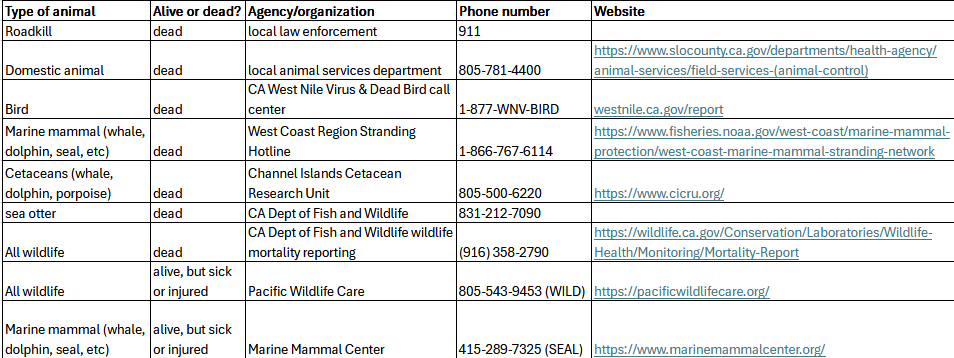
In general, it is best to avoid getting close to dead animals or their remains. You should also keep your pets or other domestic animals away from dead animals, if possible. Animal corpses can be full of bacteria, viruses, or other transmittable diseases. They can also attract scavengers or other animals that may act territorial or defensive towards you or your pets.
If you must dispose of a dead animal, or if you are asked to collect it for research purposes, you should wear gloves or other personal protective equipment. After disposing of the animal, wash your hands thoroughly with soap and water. You may also want to wash your clothes or anything else that may have come into contact with the animal.
General Roadkill or Domestic Animals
Roadkill can pose a danger for drivers, cyclists, and pedestrians, as well as for scavenger animals who may be attempting to eat it. If you encounter roadkill on the street or highway, call 911, and law enforcement will manage disposal of the animal. If you find a dead domestic animal such as a cat or dog in SLO County, you have a few options. Small animals (under 15 pounds) can be bagged and placed in your municipal trash can. Large animals (over 15 pounds) can be buried or cremated on your private property. If you feel uncomfortable disposing of the animal yourself, call your local animal services department. You can learn more about domestic animal disposal at the SLO County Field Services (animal control) website.
Birds
Because birds can carry West Nile Virus (WNV), dead bird sightings may be a sign that WNV is active in an area. If you find a dead bird, you should report it to the California West Nile Virus and Dead Bird Call Center. You can submit a report online or call 1-877-WNV-BIRD. When you make your report, an agent will ask some questions to determine whether WNV is a possible concern. You may be asked to dispose of the bird, or to send it to a lab for further testing. If you are asked to handle a bird, make sure to take precautions such as wearing gloves and washing your hands thoroughly afterwards. Although you cannot contract WNV from a dead bird, there are other bacteria and viruses that can be transmitted.
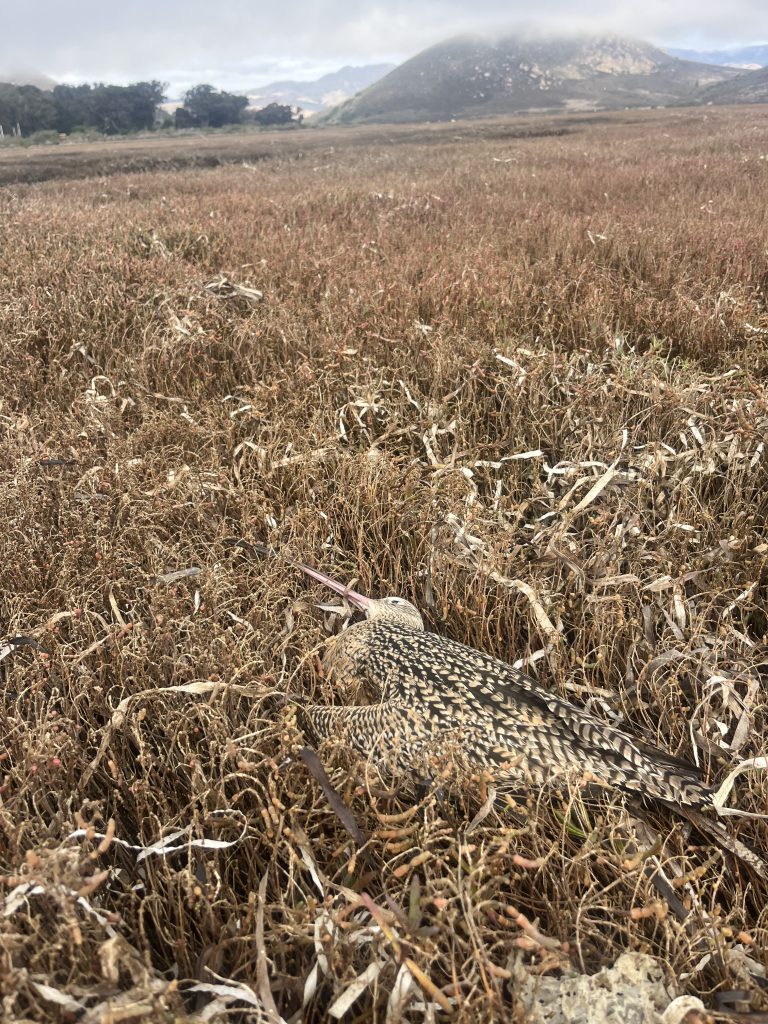
You can also report bird deaths on the California Department of Fish and Wildlife (CDFW) Wildlife Mortality Reporting webpage. Take a photo of the bird and note any tracking equipment such as bands or wing tags. This data improves CDFW’s ability to track, report, and control wildlife deaths and disease outbreaks throughout the state.
Marine Mammals
Finding dead marine mammals is not an uncommon occurrence in coastal areas such as Morro Bay. Many marine mammals are categorized as special status such as endangered or threatened. Thus, it’s important for local agencies to be aware of strandings and deaths. There are several nonprofits and government agencies that can be contacted if you find a marine mammal remains.
To report a dead, injured, or stranded marine mammal, you can contact the National Oceanic and Atmospheric Administration (NOAA) Fisheries West Coast Region Stranding Hotline at 1-866-767-6114. This number can be used anywhere in California, Oregon, and Washington. For dead cetaceans (whales, dolphins, or porpoises), you can also contact the Channel Islands Cetacean Research Unit at 805-500-6220. If you are outside of the SLO County area, this NOAA Fisheries webpage lists all regional wildlife stranding response contacts throughout the United States.
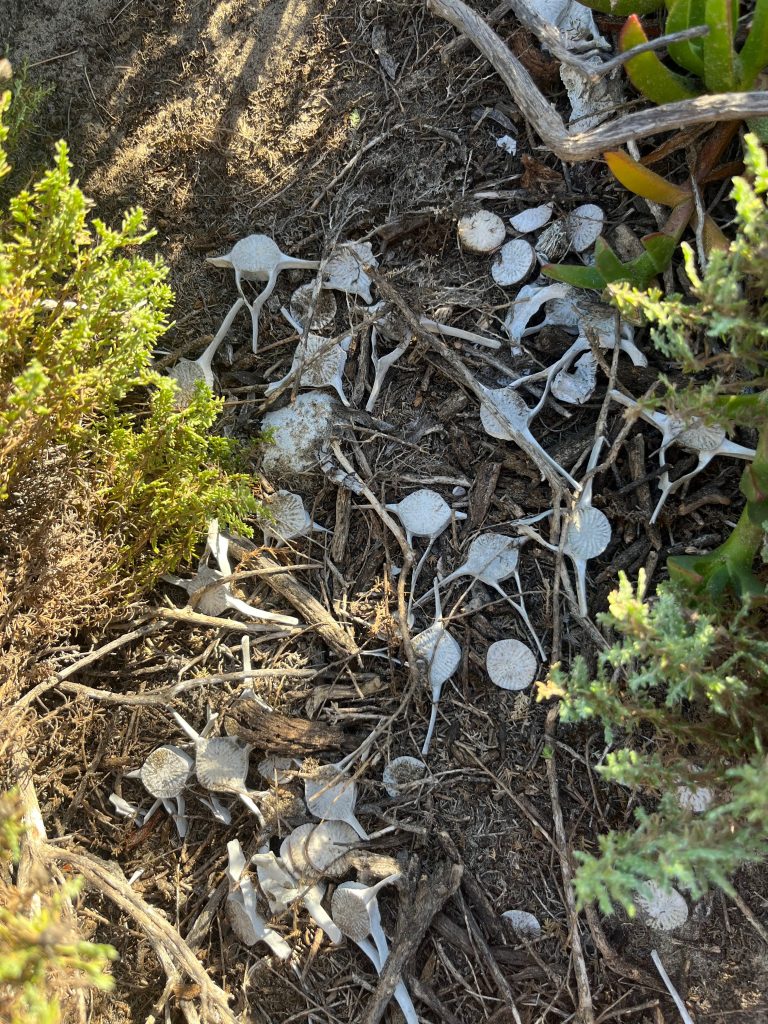
Sea otters are of special importance here on the California Central Coast due to their near extinction in the last century and current endangered status. If you find a dead sea otter, you can call the California Department of Fish and Wildlife at 831-212-7090. This number can also receive text messages and photos. You can also report sea otter deaths to the Stranding Hotline and Cetacean Research Unit (see above), as well as directly to the CDFW wildlife mortality reporting webpage. As with dead birds, you should take a photo of the animal and make a note of any visible tags or tracking devices.
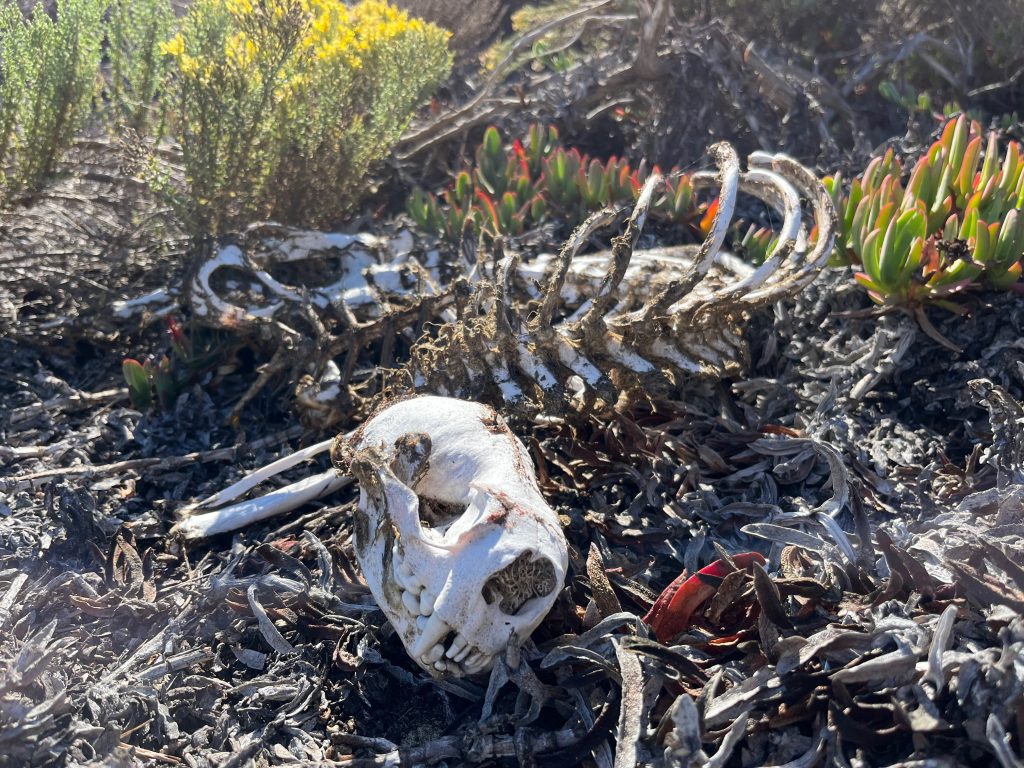
The number of options for where to report dead animals may feel overwhelming. The most important thing is that the death gets reported at least once so it can be tracked appropriately. If you accidentally contact the wrong organization, they should be able to connect you with the correct organization for the species you observed.
Can I Collect Animal Remains?
After an animal has decomposed, you may be tempted to collect remains such as bones, teeth, or other body parts. But is it legal to do so? The answer is not simple. Collection laws can vary by region, land ownership, and even by species.
According to NOAA, it is prohibited to collect, import, or export body parts or remains from marine mammals, as well as from endangered and threatened species. These species are protected under the Marine Mammal Protection Act and the Endangered Species Act (ESA), respectively. The protection given by these laws extends beyond the life of the animal.
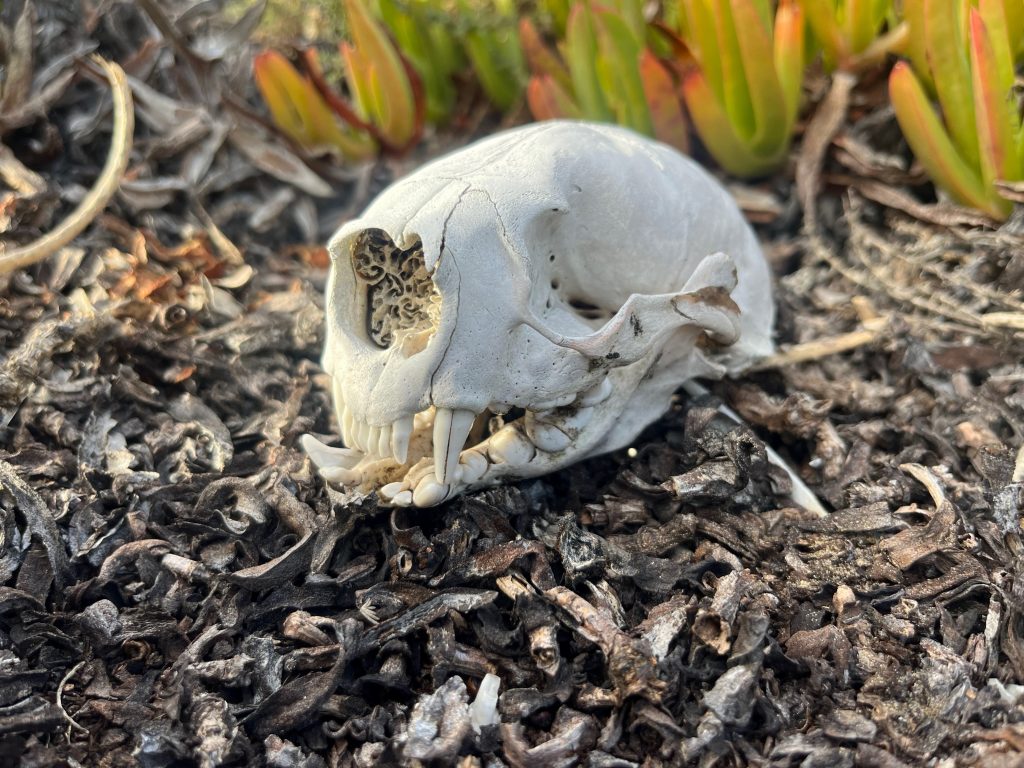
The only exception is “you may collect and keep any bones, teeth, or ivory from a non-ESA listed marine mammal found on a beach or land within one-quarter mile of an ocean, bay, or estuary. You may not collect parts from a carcass or parts with soft tissues attached. Any marine mammal bones, teeth, or ivory that you collect must be identified and registered with the nearest NOAA Fisheries Regional Office.”
Special permission for collection outside of these guidelines may be given to individuals or organizations who have scientific collection permits issued by local authorities. For more information, contact your local Department of Fish and Wildlife or other wildlife management agency.
How to Report Injured or Distressed Animals
You may occasionally see wildlife that are sick, injured, or distressed. Here in SLO County, there are two organizations that can rehabilitate injured or sick animals. Pacific Wildlife Care works with most types of wildlife. You can call them anytime at 805-543-9453 (WILD) to report an injured animal. They will come to collect it or give you further instructions. The Marine Mammal Center treats sick or injured marine mammals in California & Hawai’i. They can be reached at 415-289-7325 (SEAL). If you’re outside of SLO County, you can also contact the West Coast Region Stranding Hotline at 1-866-767-6114.
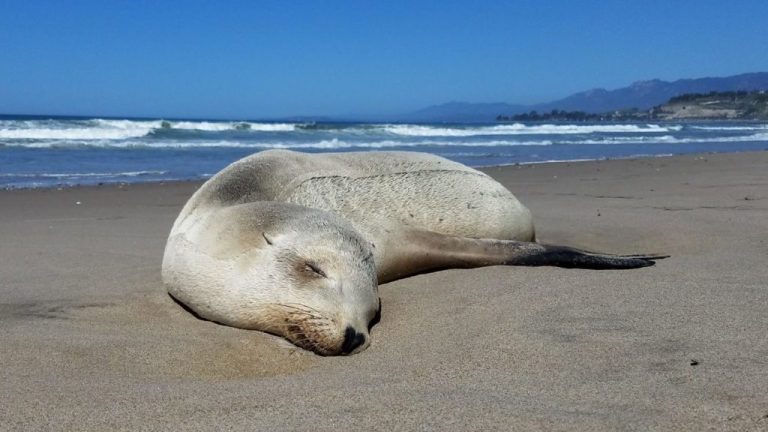
Part of being a good steward of the environment is helping to be the eyes and ears when you’re out in our coastal areas. Reporting what you find can help resource managers protect the habitats and wildlife that make this such a special place.
Help us protect and restore the Morro Bay estuary!
- Donate to the Estuary Program today and support our work in the field, the lab, and beyond.
The Estuary Program is a 501(c)3 nonprofit. We depend on funding from grants and generous donors to continue our work. - Support us by purchasing estuary-themed gear from ESTERO. This locally owned and operated company donates 20% of proceeds from its Estuary clothing line and 100% of Estuary decal proceeds to the Estuary Program. Thank you, ESTERO!
- Purchase items from the Estuary Program’s store on Zazzle. Zazzle prints and ships your items, and the Estuary Program receives 10% of the proceeds.
- Subscribe to our seasonal newsletter: Between the Tides!
- We want to hear from you! Please take a few minutes to fill out this short survey about what type of events you’d like to see from the Estuary Program. We appreciate your input!